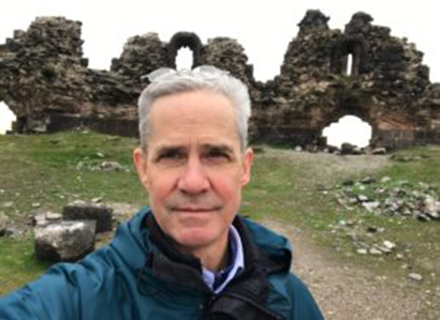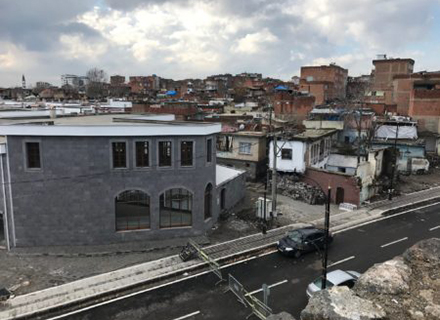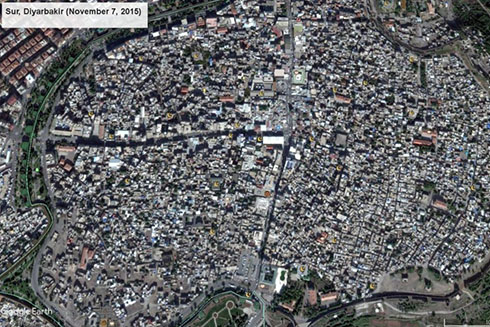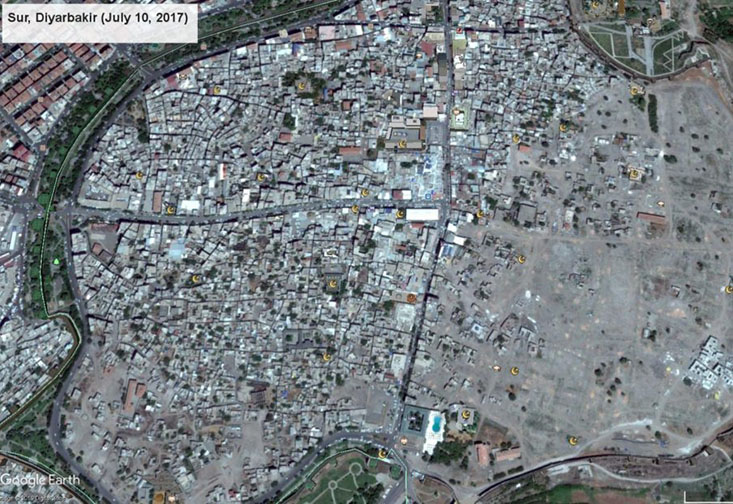For more than 3,300 years, the city of Diyarbakır in present day Turkey has been occupied by various empires – from the Romans to the Ottomans. Today, cities like Diyarbakır are at the center of an armed conflict between the Turkish government and Kurdish residents who call the city home. Heavy bombing and street fighting have wrought extensive damage on roughly a dozen Kurdish cities in southeastern Turkey.

Over the past few years, political science professor Thomas Smith has analyzed satellite imagery of these Kurdish cities, studying the effects of the conflict and “urbicide” – the destruction of cities – to understand the Turkish government’s attempts to level rebellious cities and rebuild them in its own image. In January 2020, Smith traveled to Diyarbakır to survey the damage first hand and recently submitted a paper on the study to the journal Political Geography.
“In Turkey, there is a chronic ethnic conflict between the government and the Kurds, dating back to the Ottoman Empire,” Smith said.

Although conflict between modern Turkey and the Kurds dates back to the state’s founding in the 1920s, unrest escalated after the Kurdistan Workers’ Party (PKK), which the Turkish state regards as a terrorist organization, was founded in the 1970s. Violence spiked in 2015 as Kurdish youth militia barricaded themselves in city centers. Turkish security forces responded by bombarding the cities, displacing some 300,000 people, according to Amnesty International. Rather than repair these neighborhoods, the government has decided to bulldoze and rebuild them in the neo-Ottoman style that Turkey’s president Recep Tayyip Erdoğan has promoted across the country.
While visiting Diyarbakir earlier this year, Smith surveyed the destruction and reconstruction efforts, spoke with local residents and interviewed historical preservationists. While there he witnessed a profound economic divide embodied by new high-end housing developments.
“There’s a sort of ‘disaster capitalism’ at play there,” Smith said. “Developers who are in the good graces of Erdoğan get the contracts to redevelop the bulldozed areas. In the Kurdish area, the redevelopment is intended to diminish and in some cases erase Kurdish culture, history and built environment.”
As these high-end developments go up, many Kurdish residents are priced out of their old neighborhoods.
“There isn’t just destruction and rebuilding,” Smith added. “The state is using the conflict as an opportunity to literally remake and transform the social ecology of these cities, remaking them in the image of the state.”
The contrast between old and new is perhaps most stark within Diyarbakir’s historic walled district, Sur, a UNESCO World Heritage Site.
“Erdoğan’s idea is that this will become a tourist destination,” Smith said. “The state’s development plan is to turn it into a sort of Ottoman Disneyland.”

Erdoğan’s preoccupation with revitalizing aspects of the Ottoman period is understandable, according to Smith, given the empire’s formidable cultural achievements and influence. “But that’s also a very monolithic way of thinking about these cities,” he added. “There are layers and layers of history to consider.”
Before coming to USF’s St. Petersburg campus in 2000, Smith served for three years as an assistant professor of International Relations at Koç University in Istanbul, Turkey. He has written extensively on Turkish politics and foreign policy.
His trip to Diyarbakir was made possible thanks to the 2019 Chancellor’s Award for Excellence in Global Engagement, which underwrote the trip. “I’m grateful for Chancellor Tadlock’s support and the opportunity to advance my research on Turkey,” said Smith.
He added, “This is a story that needs to be told.”
